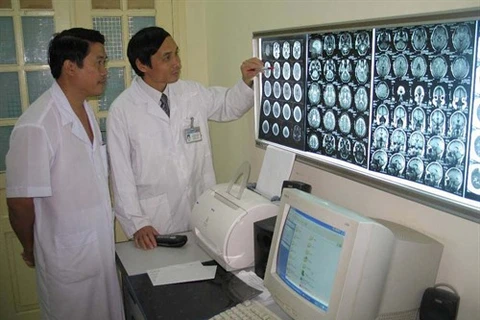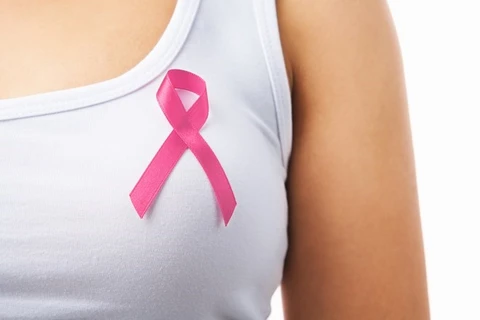Hanoi (VNA) - The Hanoi Medical University is acquiring immune cell therapy know-how from Japanese experts to treat cancer patients.
University Vice President Professor Ta Thanh Van said that this advanced treatment has been used in a number of medical centres in Japan for several years now and has proved its worth.
Three years ago, the Japanese government officially recognised cell therapy as a cancer treatment by enacting regenerative medicine legislation.
Cell therapy, also known as cytotherapy, introduces beneficial cellular materials into a patient.
The immune system, which acts like body’s home security system, classifies its targets into two types of alien substances that need to be fought off. The first group comprises of antigens like molecules, viruses, and foreign cells. The second group comprises virus-infected or tumours.
For each group, the immune system adopts different measures to neutralise the ‘threats.’
With the first group, a humoral response, or antibody-mediated response, is deployed. This involves mostly B cells being delivered to the targets.
In the case of cancer, the cell-mediated response – involving mostly T cells – is deployed to neutralise threats by the invasion of tumour cells.
However, when the immune system is compromised, the tumour cells multiply unfettered.
Cell therapy is hence used as a measure to restore the balance in the patient’s immunity, strengthen and provide facilitative conditions for the proliferation of cancer-fighting cells.
Cultivating immune cells
Prof. Van said that in cell therapy, 10-30ml of peripheral blood – a mixture of red blood cells, white blood cells and platelets – is drawn from the patients.
Immune cells are then isolated and cultivated in a special environment with the goal of activating its specialised function.
After a sufficient number of cells with the desired traits of detecting and attacking cancerous cells have been grown, they will be injected into the patient’s body, creating an immune barrier that is strong enough to keep the cancerous cells at bay, or attack them.
Currently, the therapy is considered as an effective, safer treatment without harmful side-effects since the patients get injected with primed immune cells taken from their own bodies.
Doctors at the Hanoi Medical University have, with the assistance from Japanese experts, extracted, cultivated and activated immune cells with a high rate of success, 93-99 percent.
This is considered a positive first step towards full deployment of cell therapy treatment in cancer patients.
Dr. Tran Huy Thinh of the Faculty of Biochemistry at the Hanoi Medical University said Japanese partners have committed to transferring 100 percent of this technique to the university.
Cell therapy is currently used in treating solid organ cancers – malignant tumours in the stomach, breast, lung, liver, kidney, colon, among others. Blood cancer cannot be treated with cell therapy.
In Japan, more than 80 percent of people receiving immune cell therapy last year were late-stage cancer (stage IIIB and IV) patients.
Using this therapy in combination with other measures like surgery, chemotherapy, and radiation will considerably increase the effectiveness of cancer treatment, the doctors believe.
Observed advantages include prolonged disease-free survival (inhibited tumour growth), largely improved quality of life since the patient will not suffer a lot of pain, and thus, will be free from the side-effects of painkillers.
For patients undergoing chemotherapy, the side-effects of this often-time damaging process can be partly alleviated by cell therapy.
Another advantage of cell therapy that many will appreciate is that it has little impact on their daily activities. Patients can still go to work after a 30-minute session, twice a week, six times in three consecutive months.
Starting this year
Prof. Van said doctors at the medical university are exerting their best efforts to make cell therapy a reality in Vietnam and expect to start treating cancer patients with cell therapy this year.
Van said the technology transfer had actually been set in motion two years ago.
The Hanoi Medical University has sent a delegation of leading experts in molecular and cellular biomedicine to Japan, in order to receive training in cell therapy.
The implementation of cell therapy in Vietnam will happen under periodic monitoring by Japanese experts who will also make recommendations and consultations.
As of now, the university has already met with requirements in terms of infrastructure and specialised equipment and specially qualified human resources in order to deploy the cell therapy treatment.
“Cell therapy has been in use by the Grandsoul Nara corp. since 2006. We have treated thousands of cancer patients in Japan and other countries in the region,” said Yoshinobu Matsuo, who works for the Grandsoul Nara Clinic in Japan.
“Statistics show the success rate of cancer containment at 54.4 percent; however, it is a very safe treatment. In 10 years of implementation, no significant side effects or complications have been observed so far.”
He cited a few examples. After treatment, the tumour showed signs of shrinking in a 75-year-old patient whose liver cancer had spread to the lungs. The same thing happened to a 64-year-old male patient whose cancer had metastasized, as well as a 30-year-old kidney cancer patient.
Van said a detailed proposal and programme plan is being prepared by the university’s biomedical ethics council to submit to Ministry of Health so as to get permission to conduct cell therapy on cancer patients. He is hopeful of getting the ministry’s approval, he added.
According to the National Institute for Cancer Control, more than 160,000 new cancer patients are detected every year. There are 115,000 cancer deaths ever year.
The most frequently diagnosed cancers in men are lung, stomach, liver, colon, and rectum cancers – accounting for 42,000 cases per year.
The most frequently diagnosed cancers in women are breast, lung, colorectal and cervix cancers – accounting for 30,000 cases per year.-VNA
University Vice President Professor Ta Thanh Van said that this advanced treatment has been used in a number of medical centres in Japan for several years now and has proved its worth.
Three years ago, the Japanese government officially recognised cell therapy as a cancer treatment by enacting regenerative medicine legislation.
Cell therapy, also known as cytotherapy, introduces beneficial cellular materials into a patient.
The immune system, which acts like body’s home security system, classifies its targets into two types of alien substances that need to be fought off. The first group comprises of antigens like molecules, viruses, and foreign cells. The second group comprises virus-infected or tumours.
For each group, the immune system adopts different measures to neutralise the ‘threats.’
With the first group, a humoral response, or antibody-mediated response, is deployed. This involves mostly B cells being delivered to the targets.
In the case of cancer, the cell-mediated response – involving mostly T cells – is deployed to neutralise threats by the invasion of tumour cells.
However, when the immune system is compromised, the tumour cells multiply unfettered.
Cell therapy is hence used as a measure to restore the balance in the patient’s immunity, strengthen and provide facilitative conditions for the proliferation of cancer-fighting cells.
Cultivating immune cells
Prof. Van said that in cell therapy, 10-30ml of peripheral blood – a mixture of red blood cells, white blood cells and platelets – is drawn from the patients.
Immune cells are then isolated and cultivated in a special environment with the goal of activating its specialised function.
After a sufficient number of cells with the desired traits of detecting and attacking cancerous cells have been grown, they will be injected into the patient’s body, creating an immune barrier that is strong enough to keep the cancerous cells at bay, or attack them.
Currently, the therapy is considered as an effective, safer treatment without harmful side-effects since the patients get injected with primed immune cells taken from their own bodies.
Doctors at the Hanoi Medical University have, with the assistance from Japanese experts, extracted, cultivated and activated immune cells with a high rate of success, 93-99 percent.
This is considered a positive first step towards full deployment of cell therapy treatment in cancer patients.
Dr. Tran Huy Thinh of the Faculty of Biochemistry at the Hanoi Medical University said Japanese partners have committed to transferring 100 percent of this technique to the university.
Cell therapy is currently used in treating solid organ cancers – malignant tumours in the stomach, breast, lung, liver, kidney, colon, among others. Blood cancer cannot be treated with cell therapy.
In Japan, more than 80 percent of people receiving immune cell therapy last year were late-stage cancer (stage IIIB and IV) patients.
Using this therapy in combination with other measures like surgery, chemotherapy, and radiation will considerably increase the effectiveness of cancer treatment, the doctors believe.
Observed advantages include prolonged disease-free survival (inhibited tumour growth), largely improved quality of life since the patient will not suffer a lot of pain, and thus, will be free from the side-effects of painkillers.
For patients undergoing chemotherapy, the side-effects of this often-time damaging process can be partly alleviated by cell therapy.
Another advantage of cell therapy that many will appreciate is that it has little impact on their daily activities. Patients can still go to work after a 30-minute session, twice a week, six times in three consecutive months.
Starting this year
Prof. Van said doctors at the medical university are exerting their best efforts to make cell therapy a reality in Vietnam and expect to start treating cancer patients with cell therapy this year.
Van said the technology transfer had actually been set in motion two years ago.
The Hanoi Medical University has sent a delegation of leading experts in molecular and cellular biomedicine to Japan, in order to receive training in cell therapy.
The implementation of cell therapy in Vietnam will happen under periodic monitoring by Japanese experts who will also make recommendations and consultations.
As of now, the university has already met with requirements in terms of infrastructure and specialised equipment and specially qualified human resources in order to deploy the cell therapy treatment.
“Cell therapy has been in use by the Grandsoul Nara corp. since 2006. We have treated thousands of cancer patients in Japan and other countries in the region,” said Yoshinobu Matsuo, who works for the Grandsoul Nara Clinic in Japan.
“Statistics show the success rate of cancer containment at 54.4 percent; however, it is a very safe treatment. In 10 years of implementation, no significant side effects or complications have been observed so far.”
He cited a few examples. After treatment, the tumour showed signs of shrinking in a 75-year-old patient whose liver cancer had spread to the lungs. The same thing happened to a 64-year-old male patient whose cancer had metastasized, as well as a 30-year-old kidney cancer patient.
Van said a detailed proposal and programme plan is being prepared by the university’s biomedical ethics council to submit to Ministry of Health so as to get permission to conduct cell therapy on cancer patients. He is hopeful of getting the ministry’s approval, he added.
According to the National Institute for Cancer Control, more than 160,000 new cancer patients are detected every year. There are 115,000 cancer deaths ever year.
The most frequently diagnosed cancers in men are lung, stomach, liver, colon, and rectum cancers – accounting for 42,000 cases per year.
The most frequently diagnosed cancers in women are breast, lung, colorectal and cervix cancers – accounting for 30,000 cases per year.-VNA
VNA
























